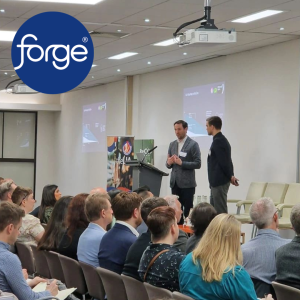The recent Net Zero Lighting Conference provided in-depth insights into the net zero emissions journeys/strategies of companies within the lighting industry and beyond. This event highlighted the complexity surrounding the adoption and implementation of net zero strategies, the impact of scale on these strategies, and the progressive nature of the lighting industry. The conference was a great success, bringing together industry leaders, experts, and innovators to discuss and share their approaches to reducing carbon emissions.

The conference opened with a warm and heartfelt welcome from Ayca, setting the stage for a day filled with insights and forward-thinking strategies but also with passion and commitment.
Case studies and industry insights into operational carbon reduction played a pivotal part in the conference. Tim Bowes and Oliver Wallace presented Whitecroft Lighting's roadmap to net zero by 2045, their leadership in the Fagerhult group approved SBTI approach was clear and they are blazing a trail with cradle-to-cradle certified assessments and one-click LCAs available on their website.
Outside of the industry, there was input from Taran Rai from Epson UK, sharing their ambitious goals to be carbon-negative and free from underground resource use by 2050. Epson’s strategy is industry-leading with perhaps much greater scope and potential than the lighting industry can reasonably command.
Throughout the conference, different case studies illustrated the diverse approaches companies are taking to understand and reduce their carbon budgets. Nigel Harvey shared Recolight’s journey in auditing its own supply chain and his own extraordinary personal commitment to the cause.
Mike Smith from Macfarlane Packaging emphasised the reduction of CO₂ emissions through optimised packaging design and improved logistics, Macfarlane’s offer of a free audit to optimise packaging from a carbon perspective was a simple step that any manufacturer could take at zero cost.
Ledvance’s Andreas Adam gave a compelling insight into sustainability with a logistics focus, demonstrating how optimising Osram’s supply and distribution chains could lead to CO₂ reductions of around one hundred thousand tonnes.
Larger companies like Epson and Osram can take small steps to create big impacts and have more resources to invest in comprehensive sustainability programs but also face more complex supply chains to manage. Smaller companies though perhaps not as well-resourced are more agile, and able to innovate and embrace cultural change, Stoane’s Irene Mizzi shared their innovative materials approach, remake initiative and community ethos, showing that efficient products and advanced controls are key drivers to reducing emissions.
All of the presenters throughout the conference gave strong views on numerous standards such as BCorps, Ecovardis, TM65.2, TM66, LCAs, EPDs, SBTIs, and PA2080. From the panel discussions, it was a clear takeaway that no single manufacturer can comply with all of the standards simultaneously without immense strain. The conference aimed to highlight some of these assessments and standards, focusing on practical steps lighting manufacturers can take to reduce carbon across all three scopes of emissions.
From a community perspective, there was an emphasis on creating standard terms of reference to ensure that as an industry, we speak the same language. For example, discussing measurement around the embodied carbon of a product in a building services context utilising CIBSE’s TM65 embodied carbon calculation methodology ensures clear objectives and meaningful information for wider project stats.
Rebecca Hatch from WSP provided a specifier’s perspective on achieving net zero, emphasising the role of intelligent design and the integration of advanced lighting controls. Her insights into the importance of early-stage design decisions in reducing carbon emissions were particularly impactful and she also highlighted the complexity of the issue with WSP incorporating data from ten self-made carbon tools and twenty-three third-party tools when calculating the Whole Life Carbon Assessment of a project.
The highlight of the afternoon was the panel discussion on whether the push for net zero is driven by commercial imperatives or environmental responsibility. Panellists from Flos, Stoane, Lucent Lighting, Islington Council, Shoplight and Nulty, debated the balance between these motivations across multiple market segments. Xander Cadisch and Lucie Sidwell gave insights into how a client pull can influence a manufacturer's journey and how their companies embraced organisational and cultural change and overcame its challenges winning and developing new customers along the way. The consensus is that while commercial benefits are undeniable, the moral imperative to address climate change is a significant driver for many. Thornton and Nulty’s self-imposed regulations on TM ratings stood out as strong thought leadership and Shortlands' insights into the retail sector's lifetime relationships and end-of-life product returns had amazing circular potential.
The Net Zero Lighting Conference was a resounding success, providing valuable insights into the countless approaches companies within the lighting industry are taking to achieve net zero. The presentations and discussions underscored the complexity of this journey, highlighting the significant impact of scale on the effectiveness of these initiatives.
As we continue on our own journey to net zero at Forge, the lessons learned from this conference will be invaluable. We are inspired by the progress made by our peers and are committed to implementing innovative solutions to reduce our carbon footprint. The conference reaffirmed that while the path to net zero is challenging, it is achievable through strategic planning, collaboration, and a steadfast commitment to sustainability.
We extend our gratitude to the organisers of the Net Zero Lighting Conference for facilitating such an informative and engaging event. The collective knowledge and shared experiences will undoubtedly propel the industry forward in its quest for a sustainable future.


